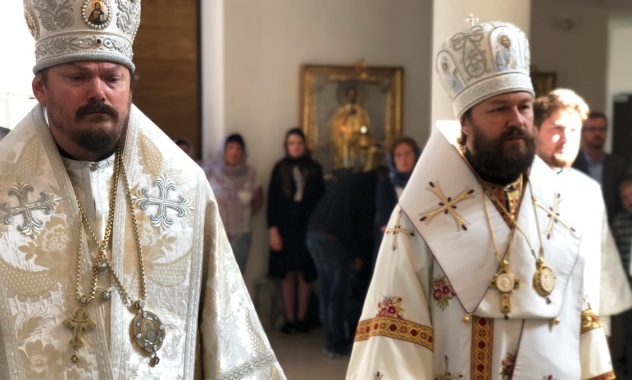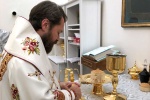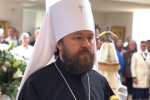Metropolitan Hilarion celebrates Liturgy at the Cathedral of the Holy Trinity in Paris
On 20 May 2018, 7th Sunday after Pascha, commemoration day of the Holy Fathers of the First Ecumenical Council, Metropolitan Hilarion of Volokolamsk, chairman of the Moscow Patriarchate’s Department for External Church Relations, celebrated the Divine Liturgy at the Cathedral of the Holy Trinity in Paris. Concelebrating with him were Bishop Nestor of Korsun and clerics of the church.
After the Liturgy Bishop Nestor warmly greeted Metropolitan Hilarion, wishing him God’s help in his important ministry as the DECR chairman.
Metropolitan Hilarion conveyed to all those present blessings from His Holiness Patriarch Kirill of Moscow and All Russia and delivered a homily, saying in particular:
“Today in the reading from the Gospel of John (the reading of this Gospel began at the Paschal night and will finish on the Feast of Pentecost) we have heard that the Lord Jesus Christ, after talking to His disciples at the Mystical Supper for the last time, addressed His Heavenly Father with a prayer. The prayer began with these words, “Father, the hour is come; glorify thy Son, that thy Son also may glorify thee: As thou hast given him power over all flesh, that he should give eternal life to as many as thou hast given him” (Jn 17:1-2).
“What hour does the Lord Jesus Christ mean? The hour, for which He came to earth. In the Cana of Galilee, when performing His first miracle at the request of His Mother, Jesus addressed the following mysterious words to her, which those around him could hardly understand, “Mine hour is not yet come” (Jn 2:4). However, speaking to His disciples not long before His death, the Saviour said, “Now is my soul troubled,” and added, “For this cause came I unto this hour” (Jn 12:27). Here He is now, talking about the hour of His suffering and death as the hour when the glory of God would be revealed – not in thunders and lightnings as it had been revealed to Moses, but in humiliation and suffering of Him Whom God sent to earth to save this world and to open the path to life eternal for each man.
“There are other words in this prayer as well, and I would like to draw your attention to them. It is the Saviour’s prayer for His disciples, when He says, “… that they may be one, as we are” (Jn 17:11), meaning His unity with the Heavenly Father. The unity that bounds up the Saviour’s disciples here on earth cannot be compared neither to bonds of kinship, nor to bonds of friendship. It is a special kinship which comes from one bread and one chalice. Every time we partake of the Bread and Body of Christ at the Holy Eucharist, we renew in ourselves our unity with God and with each other. We feel that we are members of one Body of Christ, which is, according to St. Paul, the Church, and the Head of this body is Christ (cf. Col 1:18).
“It is not in our power to restore what was destroyed in the previous generations – we can pray about this restoration and work for it, but it is only the grace of the Holy Spirit that can bring together what was destroyed by human sin or false teaching. However, the Lord commanded us to preserve the unity that we have – the unity of our Holy Orthodox Church. And we all are called to exert efforts and to lift up prayers. This unity is under threat today. It is not fortuitous that at every Divine Liturgy we pray for Ukraine – we pray for the blessed peace to return to the Ukrainian land tormented by the war, for the unity of the Orthodox Church to be restored, and for the return to the bosom of the Church of those who fell away from this unity. But not in the way which some politicians and schismatic teachers call upon to follow, saying: let us all unite – Orthodox Christians, schismatics, the Uniates – and create one church, separating it from the Russian Orthodox Church. This is not the way to achieve unity – this is the way to create a new schism. And the one holy Russian Orthodox Church is praying and patiently waiting for those who fell into schism to return to the bosom of the Church, because no human considerations, no political motivations, no national or even patriotic feelings can stand above the love for Christ and His Holy Church.
“Let us pray that the unity of our Holy Catholic and Apostolic Church might not be shaken, that all those who fell away from this unity might return to it and partake of the life eternal which God Himself gives us through His Only Begotten Son in the Holy Spirit – the life eternal which He gives us in the Church.”
That same day the chairman of the Department for External Church Relations left for Moscow.
DECR Communication Service


















